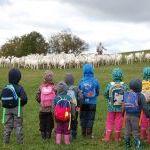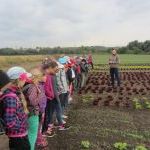Organic Farm Visit
The aim of the organic farm excursion is to acquaint pupils with the fact that the food we consume daily does not come from the supermarket, but grew on the farm thanks to the care of the farmer and natural resources. A visit to the farm will help pupils understand the relationship that exists between healthy soil, healthy plants, healthy animals and healthy people. Practical activities carried out on the farm give pupils a better idea of the process from which food is made, how it is processed and how it travels from the farm to their plate.
Website
Useful links
The Countryside Classroom website lists farms and other locations for schools to visit
Country
Media
* TOP TIP *
'Use the farm visit as an inspiring 'Wow! Day' that provides many opportunities to build on in the classroom afterwards'
How is the project linked to climate change & sustainability?
If you ask a child where the food they eat comes from, you will often hear "From the supermarket!" If we get the children to the countryside and let them experience a real day on the farm, we will help them become aware of where the food really comes from. Both agricultural production and food transport contribute significantly to the production of greenhouse gases. It is important to educate pupils about how their food choices affect the environment and are related to climate change.
Who is involved?
The farm visit will involve a farmer who is well prepared and able to deliver visits for schools. They will have good communication skills and facilities to enable children to seek shelter on a wet day, be kept safe on the visit and wash their hands. The school will organise transport for the pupils, and ensure that they adhere to their risk assessments and health and safety advice. Parents may also be involved to help adult:child supervision ratios.
How are the participants involved?
The teacher will set up the excursion with the host farm and work with the farmer to prepare the educational activities and key learning outcomes they wish to acheive. The teacher will also prepare the pupils for the visit with a session to discuss what they know about farming and what they would like to find out. Pupils learn about the farm by searching details about its production and then participate at farm activities on the farm. The school pupils will have the opportunity to experience the farm, learn about food production, ask questions and have fun.
Key steps:
1. As part of the preparation of the excursion, the teacher searches for a farm in the vicinity of the school and makes sure that it is a suitable place for the activities he intends to carry out. They then contact the farmer to discuss the intended visit.
2. The teacher agrees with the farmer on the basic rules of health and safety, and learning outcomes for the visit which are also introduced to the pupils.
3. The teacher informs the parents about the planned excursion and asks for written consent to visit the farm.
4. The teacher prepares the students for an excursion through various educational activities in the classroom
5. Sessions are delivered on the farm corresponding to the age of the pupils, with emphasis on practical activities rather than worksheets.
6. Activities are done in school after returning from the farm to consolidate the acquired knowledge.


